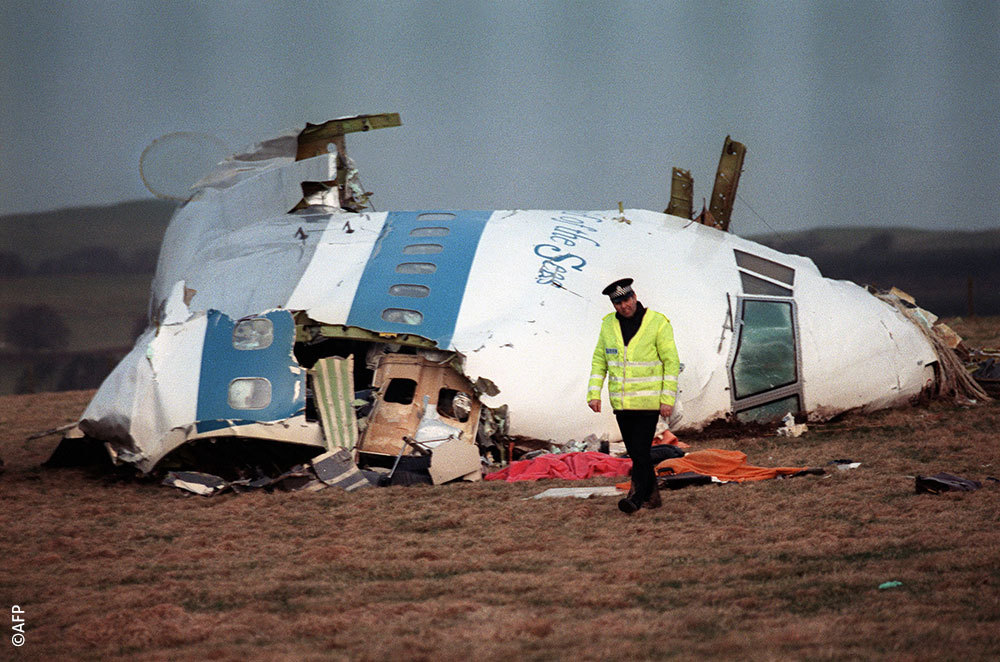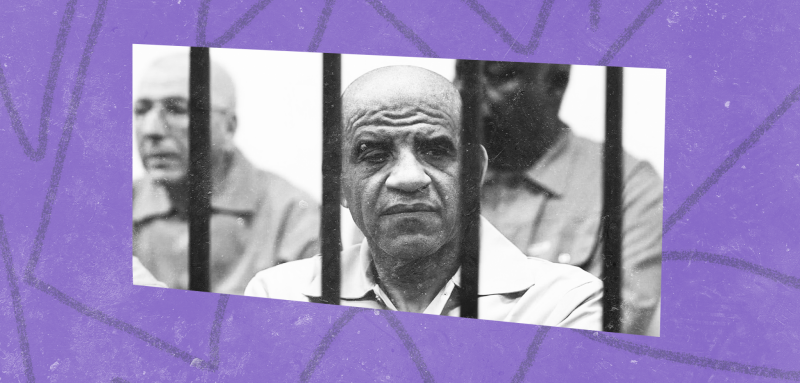Abdul Hamid Dbeibeh, the head of Libya's interim Government of National Unity (GNU), and his foreign minister, Najla Mangoush, are facing public accusations of complicity in the extradition of a Libyan national to the United States for his alleged involvement in the Lockerbie affair, nearly 33 years later, in the latest scandal of its kind in the government's scandal-ridden life, despite having been in power for only two years.
A month after his disappearance, Abu Agila al-Marimi, a former officer in the Libya intelligence service under the late Colonel Muammar Gaddafi, found himself in the hands of US, British and Scottish authorities on charges of involvement in the Lockerbie affair, which Libyans thought was completely settled after Gaddafi paid $2.7 billion in compensation to the families of the victims and handed over the two suspects who underwent a trial that convicted one and acquitted the other.
Dbeibeh had previously called for the case to be reopened in an attempt to court the administration of US President Joe Biden, when he said that the Lockerbie case file was closed abroad, but we want to open it at home to hold those who implicated us for years and caused us financial losses, accountable.
His Foreign Minister, Mangoush, also welcomed the extradition of those involved in this case, in statements that led to her work being suspended by the Presidential Council, headed by Mohamed al-Menfi, and subjecting her to investigation.
As part of his efforts to establish himself as ruler for an indefinite period of time – despite the efforts of the State Council and the House of Representatives to overthrow him – and to remain in his position that he has held for about two years, many observers believe that Dbeibeh sold his compatriot "Abu Ajila" to the investigating authorities that are pursuing him, namely the Scottish police and the US Federal Bureau of Investigation (FBI).
Although the Ministry of Justice in the Dbeibeh government considered that the Lockerbie case file could not be brought up again, after it had been completely closed politically and legally in accordance with an agreement between Libya and America in 2008, gunmen affiliated with what is known as the Joint Anti-Terrorism Force in the city of Misrata in the west of the country, kidnapped Abu Ajila from his home in the Abu Salim area of al-Mashrou’ district in the capital Tripoli, in the early hours of the morning of November 19th, and took him to an unknown location.
The case sparked widespread public outrage, while the Libyan House of Representatives called on the Attorney General to file a criminal case against those involved in the kidnapping of "Abu Ajila" and hand him over to the US authorities.
Members of the council and activists directly accused Dbeibeh of handing over the kidnapped man to America as part of a deal that ensures he keeps his position.
Members of the council and Libyan activists directly accused Dbeibeh of handing over the kidnapped man to America as part of a deal to ensure he keeps his position
The case’s origins
A bomb on a New York-bound Boeing 747 Pan Am flight exploded over the Scottish town of Lockerbie about 40 minutes after it left London's Heathrow Airport on December 21, 1988, killing 270 people, most of whom were Americans returning home for the Christmas holidays.
The crash of the plane, later known as Pan Am 103, was known historically – up until the 9/11 terrorist attacks in 2001 – as the largest terrorist attack on American civilians in history and remains the deadliest terrorist attack in UK history.
Abu Ajila worked in the Jamahiriya Security Service (Libyan intelligence), as a technical expert in building explosive devices since 1973.
The US authorities accused him of playing the role of bomb maker. A week before he left office in 2020, former US Attorney General William Barr announced the prosecution of al-Marimi, saying at a press conference, “At long last, this man responsible for killing Americans and many others will be subject to justice for his crimes,” announcing that the United States has brought criminal charges against the third conspirator, Abu Ajila Massoud, for his role in the bombing of the plane.
Confessions
According to official US documents, American investigators received information about a confession recorded by al-Marimi to a Libyan official in an interview that actually took place on September 12, 2012, just one year after the fall and death of the Gaddafi regime.
US authorities withheld the name of the Libyan official who ratted out al-Marimi, but identified him as a law enforcement officer and said he was willing to testify at trial if the Libyan government agreed.
According to the interview, which was translated from Arabic into English, between this officer and Massoud, the latter confessed to making the bomb that brought down Pan Am Flight 103, working with al-Megrahi and Fhimah to carry out the plot, and also admitted to being involved in other plots against citizens of the United States along with other Western countries.
Massoud confirmed that Pan American Flight 103 was blown up, on the orders of the command of Libyan intelligence, and said Gaddafi thanked him and the other team members for their successful attack on the United States after the operation.
During the interview, the Libyan officer said he questioned Massoud and others to determine whether they had committed any crimes against Libya and the Libyan people during the NATO-backed popular uprising against Gaddafi.
The officer recounted that prior to Massoud's interview, he knew nothing about the bombing of Pan American Flight 103, other than what he had read in the media.
When asked if he had participated in any operations in Libya or abroad, Massoud replied that he had participated in the "Lockerbie plane”, among other things, by recounting his involvement in other operations, including the bombing of the La Belle nightclub in Berlin in April 1986.
Massoud explained that the Libyan intelligence officer had asked him to travel to East Berlin to meet with the security officer at the Libyan embassy there, who later informed him that he was in the process of creating an explosive device against the nightclub, which was chosen as the target of the attack because it was frequented by US military officers.
Massoud recounted that in the winter of 1988, he was summoned by a Libyan intelligence official to a meeting in his office in Tripoli, and during that meeting, which included additional Libyan intelligence officials, Massoud was asked if the "packages" were complete, and when he answered in the affirmative, an intelligence official ordered him to take one of the suitcases and travel with it to Malta.
Massoud said that the next day he flew to Malta with the prepared suitcase, and indicated that a Libyan intelligence official told him to wait for al-Megrahi and Fhimah there in order to meet him at Malta airport.
He stated that after about three or four days in the hotel, he met them in the lobby where they asked him to wake up at exactly seven o'clock the next morning...
He said he was instructed to set the timer on the device in the bag so that the explosion would occur exactly 11 hours later. Massoud also received $500 US dollars to buy some clothes to put in a suitcase, instead of using his own clothes.
Massoud told the Libyan officer that he stood at a designated spot near the passenger baggage check at the Luqa airport, before al-Megrahi and Fhimah passed in front of him.
In an account provided by Ken Dornstein, a documentary filmmaker whose brother David died in the attack, he said that in 2012, he learned of a Libyan man living in Germany by the name of Massoud, and three years later in 2015, he received a photo of Massoud while he was being held in a Libyan prison.
US authorities withheld the name of the Libyan official who ratted out al-Marimi, but identified him as a law enforcement officer and said he was willing to testify at a trial if the Libyan government agreed
Flight Schedules
The flight schedules obtained by the US authorities link al-Marimi and both AbdelBasit al-Megrahi and al-Amin Khalifah Fhimah, the main defendants in the case, as he traveled with al-Megrahi on December 7, 1988, from Tripoli to Malta on separate flights. And only two days later Massoud traveled from Malta to Tripoli, while al-Megrahi departed from Malta to Zurich in Switzerland and continued on to Prague in the former Czechoslovakia.
But the truth of the matter is that al-Marimi was not the first Libyan citizen to be kidnapped and handed over to foreign parties. In October 2013, a special American force kidnapped Nazih Abdul-Hamed al-Ruqai'i (known by the alias Abu Anas al-Libi) and just a year later Ahmed Boukhtala was kidnapped from the eastern city of Benghazi. In addition, Mustafa al-Imam was later kidnapped from the city of Misrata in 2017.
The three were transferred to the United States, for allegedly committing crimes against American interests, which has led some to say – with the numerous cases of kidnappings of such nature – that not a year or two passes without a Libyan citizen being handed over as an offering to America.
Raseef22 is a not for profit entity. Our focus is on quality journalism. Every contribution to the NasRaseef membership goes directly towards journalism production. We stand independent, not accepting corporate sponsorships, sponsored content or political funding.
Support our mission to keep Raseef22 available to all readers by clicking here!
Interested in writing with us? Check our pitch process here!





